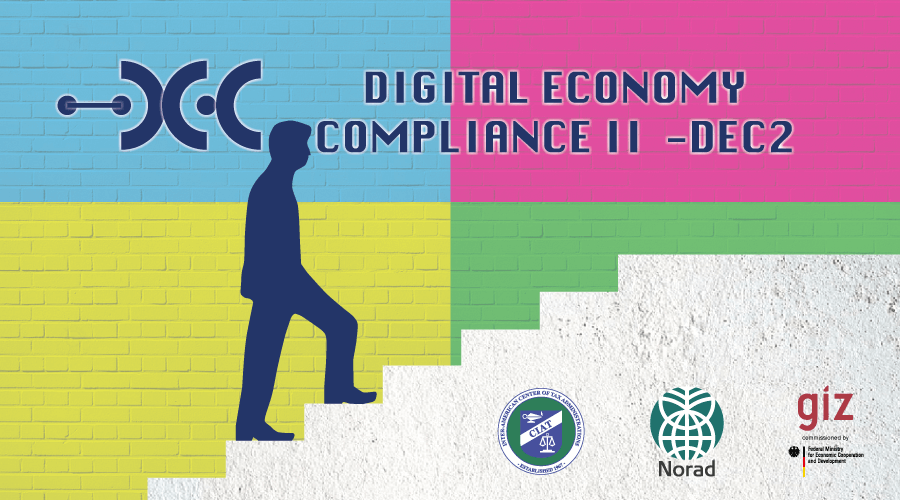Another step in the Digital Economy with the cooperation of GIZ, NORAD and CIAT

“Digital Economy Compliance II”.
One of the most discussed topics in the Tax Administration events keeps being the concern about finding a balance between the producers (taxpayers) of local digital products and services and the unfair competition of the same products and services from taxpayers without a physical presence in the country. I could discuss this subject in depth, but here we will focus on the solution.
In order to support the tax administrations with this “balance“, CIAT has started in 2020, with a co- funding from the Norwegian Cooperation – NORAD, to which we reiterate our gratitude, the development of a product to answer this need, to allow the registration of taxpayers without physical presence in the country, facilitating their sales tax return, automatic calculation of tax due, payment declaration (optional) and payment control of their tax obligations.
Since the legislations and tax rules are different in each country, reminding that many countries do not have yet an appropriate legislation covering these taxpayers without physical presence, we have developed a highly flexible system, parameterizable, from registration to tax calculation and determination of the periods for submission of these tax obligations. For the success of the product, we have consulted the tax administrations, taxation experts and diverse taxpayers. Since the taxpayers in the digital economy can be all over the planet, they can choose between English, Spanish, French, German or Portuguese. The system can also be parameterized in other languages.
After developing a strong testing plan, the system was given as completed in early 2021 and presented in several events from CIAT and other international organizations, to member and non-member countries, and in bilateral meetings with interested countries and organizations.
We can highlight that the OECD has received the Administrator access, reviewed and assessed the system without any training, using only the instruction manuals, and has fully approved the system as meeting all international standards, which gives us great pride.
The release was announced by our Executive Secretary Mr. Marcio Verdi, in the March 24, 2021 publication (https://www.ciat.org/ciatblog-la-economia-digital-la-cooperacion-noruega-y-el-ciat-una-herramienta-clave/ )
In the period 2021 to 2022, with support from NORAD, the system was installed and with individualized training was provided to Panama, Bolivia, Guatemala, and Honduras. It was also installed in Nigeria. We emphasize that all installations were parameterized to the local legislation of each country, without the need to change the system codes and followed by a strong testing plan to ensure the quality of each implementation.
By mid-2022, the GIZ (Germany) offered resources to develop two more important modules, the control and collection of tax compliance. These modules are highly automatized, and taxpayers are informed of their deadlines and compliance, as well as delays and omissions, in a fully automatic way, under parameters determined by the TA officials, without any need to change the codes.
Additionally, we took advantage of the resources to study mechanisms to increase the security of the system, since security must always be reviewed to be one step ahead of hackers. No weaknesses were found, but we identified opportunities to increase the security of the application and databases.
At this point, we thank the great collaboration of the German Cooperation – GIZ in this new implementation, which we have named “Digital Economy Compliance II” – DEC2.
The implementation of DEC2 is very fast, with no need for manual intervention. The developed scripts already create the necessary data tables and perform all the necessary migration without human intervention. For safety, it is always recommended to backup, test the backup and “take offline” the DEC system to upgrade to DEC2.
Two days of training are planned for the new modules, and a third day of practice and clarification, as several new reports and management indicators were created for the tax officers. For the taxpayers, there are no changes.
To facilitate the evaluation of these new features, we offer below the links to the documentation, new DEC2 manuals, handbook (quick guide) and a video of these new modules in operation.
English:
- DEC system. Digital Economy Compliance (Official User Manual)
- DEC system. Digital Economy Compliance (Taxpayer Manual)
- DEC system. Digital Economy Compliance (Handbook)
Spanish:
- Sistema de Cumplimiento de Economía Digital-DEC (Manual de Usuario Funcional)
- Sistema de Cumplimiento de Economía Digital-DEC (Manual de Usuario Contribuyente)
- Sistema de Cumplimiento de Economía Digital-DEC (Guía Rápida)
Video showing the new features:
(Subtitulado en Inglés, Español, Francés, Alemán y Portugués)
Control and Collection:
To make things easier, below are the links to all the other original functionalities of the system:
3,051 total views, 2 views today
